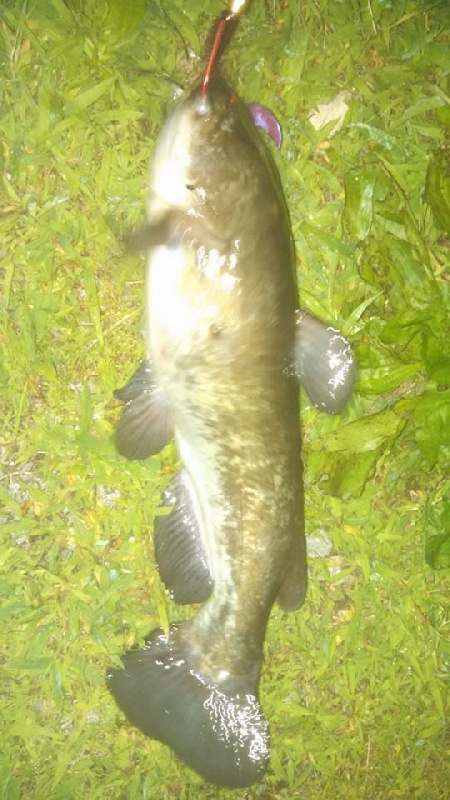Brown Bullhead Details

- Water Type: freshwater
- Latin Name: Ictalurus nebulosus
- Common Names: Brown Catfish, Bullhead, Catfish, Common Bullhead, Common Catfish, Horned Pout, Marbled Bullhead, Minister, Mudcat, Northern Brown Bullhead, Red Cat,
- Last Modified By: carpmaster on 02/01/09 06:54 PM
- Ask about Brown Bullhead in our forum
Photos






Baits and Tackle for Brown Bullhead
Nightcrawler Check Prices
Brown Bullhead Description
A medium size member of the catfish family
Length generally 8" - 14"
Weight
to about 2 lbs under ideal conditions
most average less than 1 lb
Color
olive to brown with dark mottlings on sides
fading to white or cream underneath
Body
thick and rounded, heaviest toward the front
lacks scales but the skin has many taste glands.
sharp, sawtoothed, spines at the base of the dorsal and pectoral fins which can be locked in an erect position, thought to help protect the bullhead against predators by making it much harder to swallow.
anal fin of 22/23 rays
numerous strong barbs form a serrated back side of the pectoral fin spines
tail fin square and slightly notched
adipose fin (small fin on the back in front of the tail)
Head
broad, large, somewhat flattened
teeth in pads on both jaws; used largely for tearing and pulling off pieces of food.
four pair of fleshy barbels. Those on top of the mouth are particularly long, sweeping back past the small fin in the middle of its chest.
Unlike most catfish, the upper jaw juts out slightly farther than the lower lip.
Lifespan
usually matures at age 3
lives for 6 to 8 years
Identification: Distinguished as a bullhead by its broad, flat, barbel strewn head.
Distinguished from the other bullheads by the color of its barbels:
Yellow Bullhead (Ictalurus natalis) has white barbels
Black Bullhead (Ictalurus melas) has black or grey barbels
Brown Bullhead has barbels light colored at the base, darkening to grey or black at the tips
Body color varies, and is not a reliable indicator of species
Distribution: Fresh waters of eastern and central North America, from the Maritimes to Florida, and west to southern Saskatchewan, Missouri, and Texas.
Introduced to western North America and Europe.
Habitat: Shallow, weedy, muddy areas of lakes or large slow-moving streams; also impoundments, lakes, and ponds.
Can tolerate higher water temperatures and carbon dioxide levels, and lower oxygen concentrations than many other fish species.
Resistant to domestic and industrial pollution. In areas of heavy pollution can be the only fish species present.
Food: Like many other catfish, feeds near the bottom of ponds and lakes rich in submerged plants and moss. Highly omnivorous, uses four pair of whisker-like barbels around its mouth to "taste" the water in search of food.
Nocturnal consumer of molluscs, insects, leeches, crayfish and plankton, worms, algae, plant material, and fishes.
Has been reported to feed on eggs of Cisco (Coregonus artedi), Lake Whitefish (Coregonus clupeaformis), and Lake Trout (Salvelinus namaycush).
Juveniles feed mostly on chironomid larvae, cladocerans, ostracods, amphipods, bugs, and mayflies.
Known for its delicious taste, its reputation among food lovers prompted the export of live bullheads from the US to Europe, though it never grew as large or as tasty there.
Reared commercially in the southern US.
Reproduction: Spawns rather early in spring, usually in late April or May.
Males fan out a saucer-shaped nest in the mud or nest in natural cavities where the female deposits eggs, ranging from 2,000 to 10,000, or more. The eggs are guarded by both parents during the 5 to 8 day incubation period. The parents care for the eggs by fanning them with their fins and physically stirring them up.
Upon hatching, the young are jet black and resemble tadpoles. The fry are herded about in schools for several weeks until they are about 2" long.
At the end of their first year they reach a length of about 2½" to 4" and mature in three years.
The Brown Bullhead is the only 1 of the 3 catfish species found in NH waters that is native to the state. It is the most widespread and occurs throughout the state, although it may not be native to the Androscoggin watershed. All Catfish are bottom feeders and usually feed at night. They eat nearly anything, alive or dead, and may be easily taken at night or on cloudy days, by fishing at or near the bottom with worms, minnows, corn kernels, crawfish, hellgrammites or dough balls. The Brown Bullhead is a favorite among fisherman. It's flesh is firm and sweet tasting. Many fisherman will claim it is the best tasting fish there is. Brown Bullhead range from 6-14 inches and usually weigh less than a pound. It is however, capable of reaching 18 inches and 4 pounds in NH waters. The NH state record for Brown Bullhead is 2 pounds 8.96 ounces, caught from Wilson Pond of Swanzey in 1998.